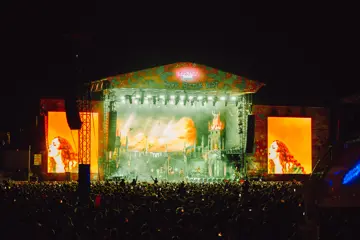 Post Malone
Post MaloneGen Z is more connected to music than any other age group.
It spends more time and money on it, and up to 69% is likely to discover new music via visual sites as TikTok, Instagram Reels and YouTube Shorts.
Being more multilingual, 78% are more likely to listen to K-Pop monthly and 30% to Afropop.
But Australia’s live sector needs to work hard to ensure this group (born 1997 to 2012, or aged 26 to 11) starts to go out to gigs for the first time, and continues to attend.
A new report suggests that attitudes to going out across age groups are softening – with close to 60% returning to pre-COVID attending of music events – but the Gen Z issue is still of concern.
It is published by UK live music industry umbrella group LIVE, and the study is of UK music fans.
But LIVE’s London-based chief economist Chris Carey – who brought his Fast Forward conference in Sydney for some years – reckons Australia can learn from the study.
“The figures might differ but the dynamics will cross over,” Carey tells TheMusic.com.au.
“There are warning signs for Australia from this report.”
For the 70 years, going to their first live music event was rites of passage for Australians, which then became a regular smoke-in for music, social and sex reasons.
But that was not the case for Gen-Zers. COVID kept them locked in for three years, and they missed out on that rites of passage.
Even worse, they remain apprehensive long after their older sisters and brothers returned to gigging.
The fear of gigs being “dangerous”, and of being in large crowds as unhealthy, remains.
For the LIVE study, insight agency Opinium collected 2,000 responses from all ages in November 2022, and another 2,000 in April 2023.
The April results show a more positive and softened attitude.
For instance, those who are attending fewer events drops to 16% from 22% five months earlier.
Recipients who think ticket prices are too expensive drop to 27% from 31%.
Those who think everything has got expensive slips from 22% to 19%.
Don't miss a beat with our FREE daily newsletter
Punters who think they have less disposable income to spend on tickets slide from 22% to 18% while those punters reducing their spending to “essentials only” are down to 15% from 19%.
But Gen Zers are a different story. One, the amount of no-shows is highest in this group.
“When you ask them why they didn’t go, a large proportion would say they bought tickets but couldn’t afford the whole night out,” Carey explains.
The other trend is to buy tickets later.
That’s been noticed by Australian promoters. “It’s hard to know if it’s going to last,” Michael Chugg told TheMusic.com.au this year.
“But it causes cash-flow and uncertainty problems.”
When asked about this trend last year, Frontier Touring’s Dion Brandt responded, “There are marginally slower ticket sales but we don’t have enough of a sample data to say it’s pronounced.”
This reluctance by Gen Z ticket buyers is partly due to apprehension they might not be able to use them due to their falling sick.
They are the age group most concerned they might not get refunds if the show is cancelled.
The LIVE study detects a significant shift in thinking, that younger fans are confident that they can still get into a show even if they wait for the last minute.
Data shows 18% of 18-24-year-olds and 16% of 25-34-year-olds are confident tickets will still be available when they’re ready.
This attitude has never been the case before with concert-goers, Carey notes.
It’s a new dynamic, where FOMO (fear of missing out) is replaced by opting for convenience.
“There was a time when music fans would do things that were inconvenient, paying upfront for tickets, working their schedule around the show and gathering their mates to travel long distances, because they knew the final result will be the glorious live experience.
“Now people expect things to be available last minute and don’t plan as far ahead.”
Carey doesn’t believe Gen Z is lost forever.
“But it would be beneficial to get them through the door for the live experience as soon as possible.”
He adds, “The battle for the next generation” is three-fold.
It’s those who haven’t come back from COVID, the ones who’ll only go to a show once a week, and those 18 to 26 year olds who still haven’t been to their first one.
There are ways to reach those who find gigging too expensive.
Package drinks, food and even parking costs with tickets; or offer two free drinks when they arrive; or allow the first ten or twenty through the doors to nominate what they will pay for entry.
The UK live music sector is urging the government to bring down ticket prices permanently to 5% of VAT (the equivalent of Australia’s GST) on live events.
It had temporarily brought VAT down to 5% from 20% during the pandemic to help the music business keep its head above water.
Some European countries have started to pay teenagers to go to concerts and other cultural activities as movies, museums and theatres.
French 18-year-olds can get a culture pass worth €300 (A$490.55) to use within two years via an app that hosts cultural offerings from over 8,000 arts businesses and institutions.
In Germany, any of the 750,000 people who turn 18 in 2023 can get a €200 ($327.10) pass which they can use over two years to make purchases via an app or website.\
Similarly Spain’s €400 ($654.20) Youth Cultural Bonus is for 18-year-olds to spend within a year on events and physical media.















